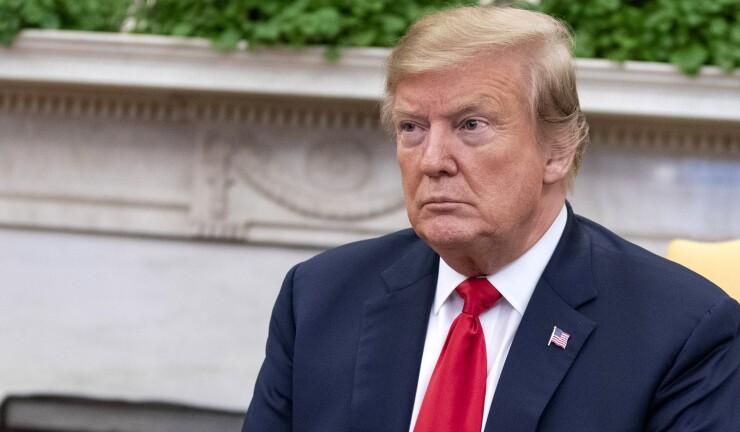The U.S. Supreme Court backed a New York grand jury’s bid for President Donald Trump’s financial records while blocking for now House subpoenas that might have led to their public release before the election.
The pair of 7-2 rulings Thursday probably spare Trump from the scrutiny that would have accompanied disclosure this year of the tax returns he has long refused to release. At the same time, the court rejected his call for sweeping immunity, leaving room for lawmakers and state prosecutors to get access to a president’s private records with a strong enough showing.
The cases were perhaps the most far-reaching of Trump’s presidency. The clashes forced Chief Justice John Roberts’s court to navigate politically polarizing and constitutionally weighty issues months before the presidential election.
Trump said on Twitter that “this is all a political prosecution.”
“The Supreme Court sends case back to Lower Court, arguments to continue,” he said. “Now I have to keep fighting in a politically corrupt New York. Not fair to this Presidency or Administration!”

In the House case, the court returned the fight to two federal appeals courts, saying they didn’t give close enough scrutiny to Trump’s contentions that the document demands would be too intrusive.
“Burdens imposed by a congressional subpoena should be carefully scrutinized, for they stem from a rival political branch that has an ongoing relationship with the president and incentives to use subpoenas for institutional advantage,” Roberts wrote for the court.
Justices Clarence Thomas and Samuel Alito dissented, saying they would have gone further and rejected the House subpoenas altogether.
“Congress’ legislative powers do not authorize it to engage in a nationwide inquisition with whatever resources it chooses to appropriate for itself,” Thomas wrote.
Roberts said both Trump and the House went too far in the positions they staked out. Trump said the House should have to show that the records are “demonstrably critical” to a legislative purpose, an approach Roberts said “would risk seriously impeding Congress in carrying out its responsibilities.”
But the House’s approach would leave “essentially no limits on the congressional power to subpoena the president’s personal records,” he said.
House Speaker Nancy Pelosi said the House will pursue the case and will be able to achieve victory in lower courts.
“The path that the Supreme Court has laid out is clearly achievable by us,” Pelosi told reporters Thursday. “It is not good news for the president of the United States.”
The House case focused on the power of Congress to demand presidential documents outside of impeachment investigations. Three House committees -- Oversight, Financial Services and Intelligence -- said they were pursuing legislative goals, including updating presidential ethics laws, fighting money laundering and trying to guard against foreign influence in U.S. elections.
Trump’s lawyers said the committees’ real pursuit was law enforcement and exposure of alleged wrongdoing. Trump’s team said those aims are beyond Congress’s constitutional authority, particularly when they involve pursuing a president’s personal records.
Vance victory
In the grand jury case, the court rejected Trump’s call to give presidents complete immunity from criminal investigation while in office.
“The president is neither absolutely immune from state criminal subpoenas seeking his private papers nor entitled to a heightened standard of need,” Roberts wrote for the court. Roberts said Trump could raise “further arguments as appropriate” but didn’t spell out what those contentions might be.
Thomas and Alito dissented in that case as well. Trump’s two appointees, Justices Neil Gorsuch and Brett Kavanaugh, were in the majority in both cases.
The ruling is a victory for Manhattan District Attorney Cyrus Vance, who is investigating whether the Trump Organization falsified business records to disguise hush payments to two women who claimed they had sex with Trump before he took office.
“This is a tremendous victory for our nation’s system of justice and its founding principle that no one -- not even a president -- is above the law,” Vance said in a statement.
Although the court upheld a federal appeals court decision in Vance’s favor, Trump’s personal attorney, Jay Sekulow, sought to portray both rulings as victories.
“We are pleased that in the decisions issued today, the Supreme Court has temporarily blocked both Congress and New York prosecutors from obtaining the president’s financial records,” he said.
The subpoenas seek years of Trump’s personal financial records, as well as those of the Trump Organization and his other businesses. They are directed to Trump’s accountants, Top 100 Firm Mazars USA, and his banks, Deutsche Bank AG and Capital One Financial Corp. The accountants and banks aren’t contesting the subpoenas and have said they will comply with their legal obligations.
Trump contended the president has complete immunity from criminal investigations while in office. He said that any investigation, even one in which the document demand goes to a third party, risks being a distraction from the chief executive’s weighty responsibilities.
Vance said presidents throughout history, including Richard Nixon and Bill Clinton, have been subject to judicial proceedings. Vance said a complete shield from investigation is especially inappropriate in a probe that doesn’t touch on the president’s official duties.
The Justice Department made a narrower argument than Trump’s personal lawyers, saying state prosecutors must make a “heightened showing of need” to get a sitting president’s personal records.





